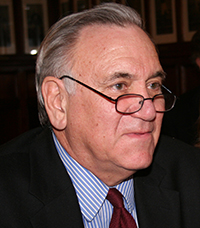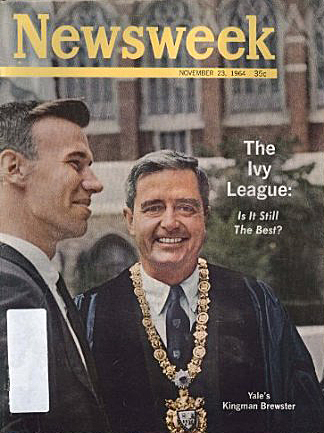Class News
Terry Holcombe '64 rediscovers Kingman Brewster's inaugural speech

In the process of moving to Walpole NH (where his neighbor is famed documentary film-maker Ken Burns), Terry Holcombe found the first page of Kingman Brewster's inaugural speech that was delivered in the spring of our senior year.
The excerpt offers some insight to Brewster's understanding of technological changes that were beginning to unfold.
Inaugural Address
Kingman Brewster, Jr.
April 11, 1964
Mr. Lewis, fellow trustees, officers, faculty, students past and present, spokesmen for higher education everywhere — I am honored to be your colleague. I join you all in a common trust of the continuity of civilization.

The weight of this responsibility is lifted by the excitement of its challenge.
The next decade of our trusteeship must cope with three revolutions: the explosion of knowledge; the burgeoning population; and the uncanny development of automated machines and mechanized intelligence.
Each of our institutions must respond in its own way. By our separate and distinctive responses perhaps we shall learn enough from each other so that we shall see in these revolutions more of hope and of opportunity than of fear. It had better be so since there can be no counter-revolution. All these revolutions are man-made, but they cannot be undone by man, short of total self-destruction.
Knowledge is our special concern. We cannot afford the restraint of knowledge for the enhancement of the power or prestige of its possessors. Excellence sometimes may require selectivity. But those of us who would be selective must guard constantly against permitting exclusiveness to be mistaken for excellence. Every university must do what it can to respond to a rapidly expanding population's need for a rapidly expanding knowledge.
If modern technology fulfills its promise, we are on the threshold of a revolution in the storing and in the transmission of knowledge which should match the revolutionary increase in population and in information.
Already lectures can be taped and stored and selected for viewing on demand. Nothing but organization and adaptation of the lecture hall stand between us and the general availability of every university's lecture courses to students everywhere within the reach of the right microwave relay.
Day after tomorrow it will be technically feasible for the core collection of any research library to be available to all institutions and students wherever they may be if only they are on the other end of a coaxial cable over which a printed page can be selected, retrieved, and reprinted.
Precisely because we at Yale may wish to continue to go about our traditional business in a traditionally selective way it behooves us to take the lead in adapting our ways to any arrangement which will make our resources publicly available as long as it does not dilute, distort, or distract us from our first mission.
...

